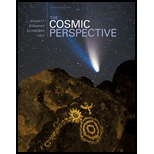
The Cosmic Perspective
7th Edition
ISBN: 9780321839558
Author: Jeffrey O. Bennett, Megan O. Donahue, Nicholas Schneider, Mark Voit
Publisher: Addison-Wesley
expand_more
expand_more
format_list_bulleted
Textbook Question
Chapter 2, Problem 15EAP
What do we mean by the apparent retrograde motion of the planets? Why was this motion difficult for ancient astronomers to explain? How do we explain it today?
Expert Solution & Answer
Want to see the full answer?
Check out a sample textbook solution
Students have asked these similar questions
In the figure Q = 5.7 nC and all other quantities are accurate to 2 significant figures. What is the magnitude of the force on the charge Q? (k = 1/4πε 0 = 8.99 × 109 N · m2/C2)
Now add a fourth charged particle, particle 3, with positive charge q3, fixed in the yz-plane at (0,d2,d2). What is the net force F→ on particle 0 due solely to this charge? Express your answer (a vector) using k, q0, q3, d2, i^, j^, and k^. Include only the force caused by particle 3.
For a tornadoes and hurricanes, which of the following is most critical?
an alert
a watch
a warning
a prediction
Chapter 2 Solutions
The Cosmic Perspective
Ch. 2 - Prob. 1VSCCh. 2 - Use the following questions to check your...Ch. 2 - Use the following questions to check your...Ch. 2 - Use the following questions to check your...Ch. 2 - Use the following questions to check your...Ch. 2 - Use the following questions to check your...Ch. 2 - Use the following questions to check your...Ch. 2 - Use the following questions to check your...Ch. 2 - Prob. 1EAPCh. 2 - Suppose you were making a model of the celestial...
Ch. 2 - On a clear, dark night, the sky may appear to be...Ch. 2 - Why does the local sky look like a dome? Define...Ch. 2 - Prob. 5EAPCh. 2 - What are circumpolar stars? Are more stars...Ch. 2 - What are latitude and longitude? Does the sky vary...Ch. 2 - What is the zodiac, and why do we see different...Ch. 2 - Suppose Earth’s axis had no tilt. Would we still...Ch. 2 - Briefly describe key facts about the solstices and...Ch. 2 - What is precession? How does it affect what we see...Ch. 2 - Briefly describe the Moon’s cycle of phases. Can...Ch. 2 - Why do we always see the same face of the Moon?Ch. 2 - Why don’t we see an eclipse at every new and full...Ch. 2 - What do we mean by the apparent retrograde motion...Ch. 2 - Prob. 16EAPCh. 2 - Prob. 17EAPCh. 2 - Prob. 18EAPCh. 2 - Prob. 19EAPCh. 2 - Prob. 20EAPCh. 2 - Does It Make Sense? Decide whether the statement...Ch. 2 - Does It Make Sense? Decide whether the statement...Ch. 2 - Prob. 23EAPCh. 2 - Does It Make Sense? Decide whether the statement...Ch. 2 - Does It Make Sense? Decide whether the statement...Ch. 2 - Does It Make Sense? Decide whether the statement...Ch. 2 - Quick Quiz Choose the best answer to each of the...Ch. 2 - Quick Quiz Choose the best answer to each of the...Ch. 2 - Quick Quiz Choose the best answer to each of the...Ch. 2 - Prob. 30EAPCh. 2 - Quick Quiz Choose the best answer to each of the...Ch. 2 - Quick Quiz Choose the best answer to each of the...Ch. 2 - Quick Quiz Choose the best answer to each of the...Ch. 2 - Quick Quiz Choose the best answer to each of the...Ch. 2 - Quick Quiz Choose the best answer to each of the...Ch. 2 - Quick Quiz Choose the best answer to each of the...Ch. 2 - Earth-Centered or Sun-Centered? Decide whether...Ch. 2 - Shadow Phases. Many people incorrectly guess that...Ch. 2 - Lunar Phases and Time of Day. Roles: Scribe (takes...Ch. 2 - New Planet. A planet in another solar system has a...Ch. 2 - Your View of the Sky. a. What are your latitude...Ch. 2 - View from the Moon. Assume you live on the Moon,...Ch. 2 - View from the Sun. Suppose you lived on the Sun...Ch. 2 - A Farther Moon. Suppose the distance to the Moon...Ch. 2 - A Smaller Earth. Suppose Earth were smaller. Would...Ch. 2 - Observing Planetary Motion. Find out which planets...Ch. 2 - 47. A Connecticut Yankee. Find the book A...Ch. 2 - Be sure to show all calculations clearly and state...Ch. 2 - Be sure to show all calculations clearly and state...Ch. 2 - Be sure to show all calculations clearly and state...Ch. 2 - Be sure to show all calculations clearly and state...Ch. 2 - Prob. 52EAPCh. 2 - Prob. 53EAPCh. 2 - Prob. 54EAPCh. 2 - Be sure to show all calculations clearly and state...Ch. 2 - Prob. 56EAPCh. 2 - Prob. 57EAPCh. 2 - Prob. 58EAPCh. 2 - Prob. 59EAPCh. 2 - Prob. 60EAP
Knowledge Booster
Learn more about
Need a deep-dive on the concept behind this application? Look no further. Learn more about this topic, physics and related others by exploring similar questions and additional content below.Similar questions
- When a warm front advances up and over a cold front, what is it called? front inversion stationary front cold front occlusion warm front occlusionarrow_forward1) Consider two positively charged particles, one of charge q0 (particle 0) fixed at the origin, and another of charge q1 (particle 1) fixed on the y-axis at (0,d1,0). What is the net force F→ on particle 0 due to particle 1? Express your answer (a vector) using any or all of k, q0, q1, d1, i^, j^, and k^. 2) Now add a third, negatively charged, particle, whose charge is −q2− (particle 2). Particle 2 fixed on the y-axis at position (0,d2,0). What is the new net force on particle 0, from particle 1 and particle 2? Express your answer (a vector) using any or all of k, q0, q1, q2, d1, d2, i^, j^, and k^. 3) Particle 0 experiences a repulsion from particle 1 and an attraction toward particle 2. For certain values of d1 and d2, the repulsion and attraction should balance each other, resulting in no net force. For what ratio d1/d2 is there no net force on particle 0? Express your answer in terms of any or all of the following variables: k, q0, q1, q2.arrow_forwardA 85 turn, 10.0 cm diameter coil rotates at an angular velocity of 8.00 rad/s in a 1.35 T field, starting with the normal of the plane of the coil perpendicular to the field. Assume that the positive max emf is reached first. (a) What (in V) is the peak emf? 7.17 V (b) At what time (in s) is the peak emf first reached? 0.196 S (c) At what time (in s) is the emf first at its most negative? 0.589 x s (d) What is the period (in s) of the AC voltage output? 0.785 Sarrow_forward
- A bobsled starts at the top of a track as human runners sprint from rest and then jump into the sled. Assume they reach 40 km/h from rest after covering a distance of 50 m over flat ice. a. How much work do they do on themselves and the sled which they are pushing given the fact that there are two men of combined mass 185 kg and the sled with a mass of 200 kg? (If you haven't seen bobsledding, watch youtube to understand better what's going on.) b. After this start, the team races down the track and descends vertically by 200 m. At the finish line the sled crosses with a speed of 55 m/s. How much energy was lost to drag and friction along the way down after the men were in the sled?arrow_forwardFor what type of force is it not possible to define a potential energy expression?arrow_forward10. Imagine you have a system in which you have 54 grams of ice. You can melt this ice and then vaporize it all at 0 C. The melting and vaporization are done reversibly into a balloon held at a pressure of 0.250 bar. Here are some facts about water you may wish to know. The density of liquid water at 0 C is 1 g/cm³. The density of ice at 0 C is 0.917 g/cm³. The enthalpy of vaporization of liquid water is 2.496 kJ/gram and the enthalpy of fusion of solid water is 333.55 J/gram.arrow_forward
- Consider 1 mole of supercooled water at -10°C. Calculate the entropy change of the water when the supercooled water freezes at -10°C and 1 atm. Useful data: Cp (ice) = 38 J mol-1 K-1 Cp (water) 75J mol −1 K -1 Afus H (0°C) 6026 J mol −1 Assume Cp (ice) and Cp (water) to be independent of temperature.arrow_forwardThe molar enthalpy of vaporization of benzene at its normal boiling point (80.09°C) is 30.72 kJ/mol. Assuming that AvapH and AvapS stay constant at their values at 80.09°C, calculate the value of AvapG at 75.0°C, 80.09°C, and 85.0°C. Hint: Remember that the liquid and vapor phases will be in equilibrium at the normal boiling point.arrow_forward3. The entropy of an ideal gas is S = Nkg In V. Entropy is a state function rather than a path function, and in this problem, you will show an example of the entropy change for an ideal gas being the same when you go between the same two states by two different pathways. A. Express ASV = S2 (V2) - S₁(V1), the change in entropy upon changing the volume from V₁to V2, at fixed particle number N and energy, U. B. Express ASN = S₂(N₂) - S₁ (N₁), the change in entropy upon changing the particle number from N₁ to N2, at fixed volume V and energy U. C. Write an expression for the entropy change, AS, for a two-step process (V₁, N₁) → (V2, N₁) → (V2, N₂) in which the volume changes first at fixed particle number, then the particle number changes at fixed volume. Again, assume energy is constant.arrow_forward
- Please don't use Chatgpt will upvote and give handwritten solutionarrow_forward6. We used the constant volume heat capacity, Cv, when we talked about thermodynamic cycles. It acts as a proportionality constant between energy and temperature: dU = C₁dT. You can also define a heat capacity for constant pressure processes, Cp. You can think of enthalpy playing a similar role to energy, but for constant pressure processes δαρ C = (37) - Sup Ср ат P = ат Starting from the definition of enthalpy, H = U + PV, find the relationship between Cy and Cp for an ideal gas.arrow_forwardPure membranes of dipalmitoyl lecithin phospholipids are models of biological membranes. They melt = 41°C. Reversible melting experiments indicate that at Tm AHm=37.7 kJ mol-1. Calculate: A. The entropy of melting, ASm- B. The Gibbs free energy of melting, AGm- C. Does the membrane become more or less ordered upon melting? D. There are 32 rotatable CH2 CH2 bonds in each molecule that can rotate more freely if the membrane melts. What is the increase in multiplicity on melting a mole of bonds?arrow_forward
arrow_back_ios
SEE MORE QUESTIONS
arrow_forward_ios
Recommended textbooks for you

 Stars and GalaxiesPhysicsISBN:9781305120785Author:Michael A. Seeds, Dana BackmanPublisher:Cengage Learning
Stars and GalaxiesPhysicsISBN:9781305120785Author:Michael A. Seeds, Dana BackmanPublisher:Cengage Learning Foundations of Astronomy (MindTap Course List)PhysicsISBN:9781337399920Author:Michael A. Seeds, Dana BackmanPublisher:Cengage Learning
Foundations of Astronomy (MindTap Course List)PhysicsISBN:9781337399920Author:Michael A. Seeds, Dana BackmanPublisher:Cengage Learning Stars and Galaxies (MindTap Course List)PhysicsISBN:9781337399944Author:Michael A. SeedsPublisher:Cengage Learning
Stars and Galaxies (MindTap Course List)PhysicsISBN:9781337399944Author:Michael A. SeedsPublisher:Cengage Learning
 AstronomyPhysicsISBN:9781938168284Author:Andrew Fraknoi; David Morrison; Sidney C. WolffPublisher:OpenStax
AstronomyPhysicsISBN:9781938168284Author:Andrew Fraknoi; David Morrison; Sidney C. WolffPublisher:OpenStax


Stars and Galaxies
Physics
ISBN:9781305120785
Author:Michael A. Seeds, Dana Backman
Publisher:Cengage Learning

Foundations of Astronomy (MindTap Course List)
Physics
ISBN:9781337399920
Author:Michael A. Seeds, Dana Backman
Publisher:Cengage Learning

Stars and Galaxies (MindTap Course List)
Physics
ISBN:9781337399944
Author:Michael A. Seeds
Publisher:Cengage Learning


Astronomy
Physics
ISBN:9781938168284
Author:Andrew Fraknoi; David Morrison; Sidney C. Wolff
Publisher:OpenStax
Kepler's Three Laws Explained; Author: PhysicsHigh;https://www.youtube.com/watch?v=kyR6EO_RMKE;License: Standard YouTube License, CC-BY